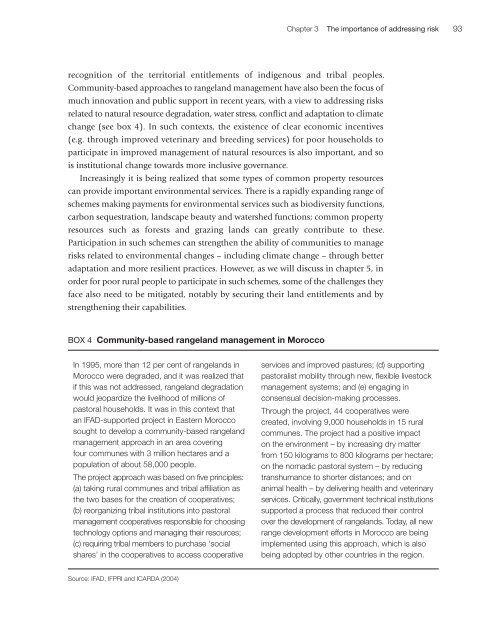English - IFAD
English - IFAD
English - IFAD
You also want an ePaper? Increase the reach of your titles
YUMPU automatically turns print PDFs into web optimized ePapers that Google loves.
Chapter 3 The importance of addressing risk 93<br />
recognition of the territorial entitlements of indigenous and tribal peoples.<br />
Community-based approaches to rangeland management have also been the focus of<br />
much innovation and public support in recent years, with a view to addressing risks<br />
related to natural resource degradation, water stress, conflict and adaptation to climate<br />
change (see box 4). In such contexts, the existence of clear economic incentives<br />
(e.g. through improved veterinary and breeding services) for poor households to<br />
participate in improved management of natural resources is also important, and so<br />
is institutional change towards more inclusive governance.<br />
Increasingly it is being realized that some types of common property resources<br />
can provide important environmental services. There is a rapidly expanding range of<br />
schemes making payments for environmental services such as biodiversity functions,<br />
carbon sequestration, landscape beauty and watershed functions; common property<br />
resources such as forests and grazing lands can greatly contribute to these.<br />
Participation in such schemes can strengthen the ability of communities to manage<br />
risks related to environmental changes – including climate change – through better<br />
adaptation and more resilient practices. However, as we will discuss in chapter 5, in<br />
order for poor rural people to participate in such schemes, some of the challenges they<br />
face also need to be mitigated, notably by securing their land entitlements and by<br />
strengthening their capabilities.<br />
BOX 4 Community-based rangeland management in Morocco<br />
In 1995, more than 12 per cent of rangelands in<br />
Morocco were degraded, and it was realized that<br />
if this was not addressed, rangeland degradation<br />
would jeopardize the livelihood of millions of<br />
pastoral households. It was in this context that<br />
an <strong>IFAD</strong>-supported project in Eastern Morocco<br />
sought to develop a community-based rangeland<br />
management approach in an area covering<br />
four communes with 3 million hectares and a<br />
population of about 58,000 people.<br />
The project approach was based on five principles:<br />
(a) taking rural communes and tribal affiliation as<br />
the two bases for the creation of cooperatives;<br />
(b) reorganizing tribal institutions into pastoral<br />
management cooperatives responsible for choosing<br />
technology options and managing their resources;<br />
(c) requiring tribal members to purchase ‘social<br />
shares’ in the cooperatives to access cooperative<br />
services and improved pastures; (d) supporting<br />
pastoralist mobility through new, flexible livestock<br />
management systems; and (e) engaging in<br />
consensual decision-making processes.<br />
Through the project, 44 cooperatives were<br />
created, involving 9,000 households in 15 rural<br />
communes. The project had a positive impact<br />
on the environment – by increasing dry matter<br />
from 150 kilograms to 800 kilograms per hectare;<br />
on the nomadic pastoral system – by reducing<br />
transhumance to shorter distances; and on<br />
animal health – by delivering health and veterinary<br />
services. Critically, government technical institutions<br />
supported a process that reduced their control<br />
over the development of rangelands. Today, all new<br />
range development efforts in Morocco are being<br />
implemented using this approach, which is also<br />
being adopted by other countries in the region.<br />
Source: <strong>IFAD</strong>, IFPRI and ICARDA (2004)

















